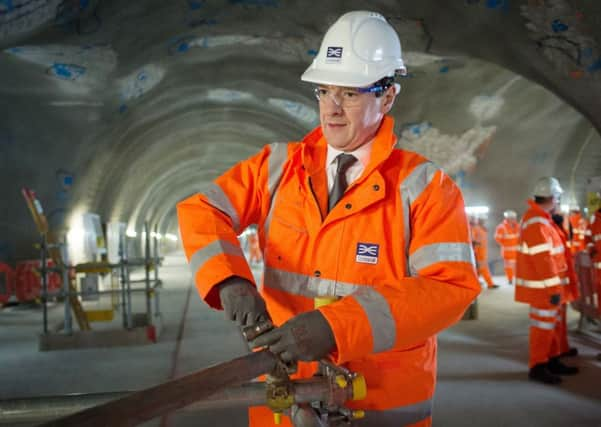YP Comment: Running scared? Time for George Osborne to confront critics


At least David Cameron faced down his critics following Work and Pensions Secretary Iain Duncan Smith’s resignation. He had no choice – the PM’s planned Commons statement on last week’s EU summit was overshadowed by the fallout from the now aborted squeeze on welfare payments to the disabled.
The same cannot be said for the Chancellor. After cancelling a planned visit to Wales, he did not turn up to answer a Labour urgent question in Parliament and left David Gauke, a junior Treasury minister, to respond to MPs on his behalf. It’s not the first time that Mr Osborne’s loyal colleague has been left in such an invidious position.
Advertisement
Hide AdAdvertisement
Hide AdYet this was another misjudgment from Mr Osborne who could, and should, have taken the opportunity to confront his critics and explain how the now gaping £4bn-plus “black hole” in his Budget will be filled. He can’t delay the decision until the Autumn Statement as he intends – MPs have to vote on the Finance Bill tonight and a Government victory is not assured. Though it might have inconvenienced the Chancellor, a show of contrition a would have been the responsible – even statesmanlike – course of action in the face of Mr Duncan Smith resigning two days after the Budget was delivered.
As such, the onus is now on Mr Osborne to explain how payments to the disabled will be funded and how he intends to balance the books. For, if the cuts to welfare payments have, in fact, been reversed, it leaves him with one of two options – cuts in another policy sphere or tax rises. Which is it? The country has a right to know. After all, this is what he would demand of Labour if the tables were turned.
Fairness for all: Equal pay is now a defining issue
AT least attitudes towards gender equality appear more enlightened here than in America where Raymond Moore, the dinosaur-like chief executive of the prestigious Indian Wells tennis tournament, says female players should drop to their knees and “thank God that Roger Federer and Rafael Nadal were born”.
Yet, while tennis is split over the issue of equal pay, the greater concern is the pace of change here and the pedestrian progress that the Government is making when it comes to ensuring that female workers doing the same job as their male counterparts are paid exactly the same.
Advertisement
Hide AdAdvertisement
Hide AdThis injustice, unacceptable in the 21st century, needs to be eradicated and the Government should not hesitate to replicate the boldness that it did show when announcing the National Living Wage.
However it does not end here. It’s also important that more women remain at the forefront of public life in Britain, whether it be politics, business or academia. If they are, there is a greater likelihood that outdated attitudes will finally consigned to history.
It’s just a shame, therefore, that David Cameron did not use Work and Pensions Secretary Iain Duncan Smith’s resignation to the Cabinet to promote another woman to his Cabinet. What did he do? He promoted Stephen Crabb, a white, middle-aged male politician who, in turn, was replaced by another white, middle aged male politician.
Perhaps if Ministers were more representative of society, and modern life, the Government might have realised it was wrong to cut benefits to the disabled in the Budget while also paving the way simultaneously for tax breaks for the better-off.
Flooding facts: Time to stem tide of ignorance
Advertisement
Hide AdAdvertisement
Hide AdEIGHT weeks to the day after The Yorkshire Post published an open letter to David Cameron over flooding policy, it is welcome that Leeds City Region councils are beginning a review of their own into the devastation caused at Christmas while the county awaits the Prime Minister’s response.
Yet it is also important that this exercise is not restricted to artificial local government boundaries. The problem needs to be tackled at source and that means river catchment areas being considered in their entirety and not on a piecemeal basis.
Unless ways can be found to slow the flow of water in upland areas, communities downstream will be at greater risk of flooding. This lesson in basic geography needs to be applied to this review process before such short-sightedness leads to even more homes, businesses and jobs being washed away on a tide of ignorance because councils across the region are struggling to pool their expertise.